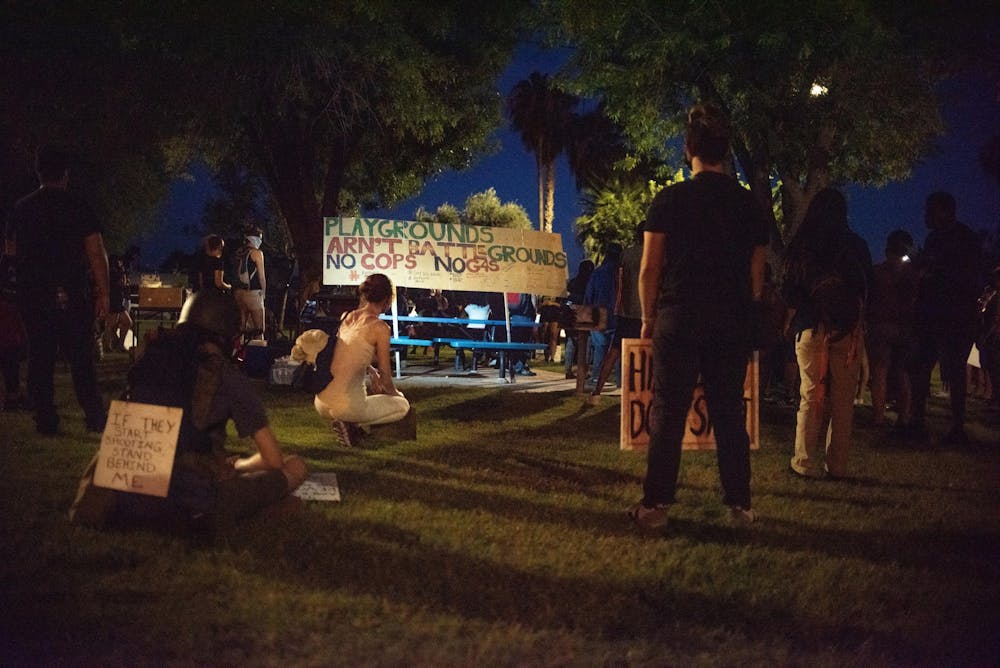Tempe City Council approved some of its projected budget adjustments by default at its special virtual meeting Thursday after a city-wide financial review of economic impacts caused by COVID-19.
Submitted community comments and dialogue between members during the meeting will be considered and evaluated in the creation of a new adjustment list to be discussed again in August.
In the meantime, the budget — worth over $777 million — with adjustments members had no issue with, will take effect July 1. Staff will seek approval of all of the adjustments at a later meeting in August.
Budget adjustments consist of funding cuts and reallocations to a variety of department budgets for the upcoming fiscal year, including police, fire, park maintenance and recreation programs — all within Tempe's roughly $240 million general fund.
These adjustments and the general fund's "strong financial position" may help prevent the city from having to drastically reduce services and layoff internal employees over the coming fiscal year, according to an 885-page budget and adjustment summary.
Tempe's first Black mayor, Corey Woods, and new council members will be sworn in on July 2. There are no scheduled meetings other than the formal inauguration for the month of July. City council's communication and media relations manager Nikki Ripley said unresolved budget items will be discussed August 20 at a work study session with the chief financial officer's team.
"Tempe must cut $14 million from its budget because we lost sales tax revenue when businesses and hotels closed or operated less. Those losses are projected to continue into 2020-21, with the timeline of recovery uncertain," a joint statement from Tempe Mayor Mark Mitchell and Mayor-elect Woods said.
The city asked departments to identify $24 million in potential budget adjustments, which represents about 10% of the budget's general fund. More than a third of the recommended reductions come out of the police department’s funding.
"I can almost guarantee you, these cuts will be necessary, regardless of what happens," said Tempe chief financial officer Ken Jones. "So we can't stray too far from these targets."
Some of the adjustments could impact recreational activities, such as ASU's homecoming, due to a reduction in wages for the recreation services marketing and outreach program.
Prior to discussing adjustments, the council spent over two hours praising Mitchell and showering him with gifts, including a painting and a framed photo of the city council.
The council spent time remembering their inside jokes with Mitchell and commemorating him for his service. A slideshow displayed photos of Mitchell working in Tempe as council members thanked him for guidance and inspiration. Each council member gave a speech and Mitchell addressed each council member afterward.
Budget adjustments were ranked in tiers for adoptability
The adjustments were prioritized in three tiers: the first tier is recommended adjustments to budget proposals for police, internal services, purchases, internal hires and more, which would cut nearly $14 million. The second tier is not recommended to be changed unless budget adjustments are necessary after the initial adjustments. The third tier is not recommended to be adjusted.
Items in the first tier that members had no questions about will move forward and take effect July 1. But council members had concerns about cuts to the Tempe Fire Medical Rescue dive team, ambulance station construction and internal custodial funds, so a final decision still lingers.
The first tier of adjustments features cuts across the board, including a $140,000 cut to city utilities, an elimination of museum education activities worth $10,000 and multiple hiring freezes and salary reductions across departments.
The adjustments discussed Thursday had planned to transfer funds from miscellaneous projects and other plans to the general fund while also cutting funding across departments. That includes cutting $5.5 million from the police department by freezing new officer hires, delaying purchases and reducing overtime pay.
The killings of George Floyd in Minneapolis and Dion Johnson in Phoenix have prompted protests throughout the state since May and Floyd's death have resulted in national calls for the defunding of police.
The Tempe budget, like many other cities, features a large percentage of tax dollars going to police. Advocates for defunding the police department have called for those resources to go to other "safer" community departments like education, health services, social work and more.
Protesters across the valley have asked council members to defund the police, but the proposed cut to the budget is in response to the financial deficit brought on by the city's lost revenues from COVID-19.
Citizens who spoke during the meeting noted that millions of dollars in cuts recommended for community resources could be avoided by approving six adjustments to the police department that are not recommended. Those cuts to the police would save the city over $4 million.
Freezing hiring for 21 positions in the police department, which is not recommended, would save the city over $3,200,000.
"Operations drive the budget, it's not the budget that drives the operations," Vice Mayor Lauren Kuby said of the police department's budget. Lopping off funding, she added, "without a plan for actual reform, for actual systemic change" would just be giving citizens "a symbolic win, but it doesn't give you the change that you're looking for."
While the council was discussing cuts to the police budget, protesters gathered at Meyer Park in Tempe to encourage the council to defund the department.
Other items that the council is hoping to further review and discuss at a later date are code enforcement, AED equipment maintenance, recreation programs at Kiwanis Recreation Center, desert park encampment cleanups, employee training and building preventative maintenance.
COVID-19's impact and the city's plan for adaptability
If needed, Ripley said more cuts can be made if the COVID-19 pandemic causes further needed adjustments to the budget.
Akheil Singla, an assistant professor in the School of Public Affairs at the Watts College of Public Service and Community Solutions, whose research focuses on local, public financial management says city and local budgets are more of a planning document than anything.
"Oftentimes (when adjustments have to be made), you're operating in environments of tremendous uncertainty," Singla said. "The goal is to have a good plan for the future so that you know how to balance resources coming in with your obligations going out."
A city "cannot spend more than it brings in," Singla said. Making cuts to a budget is incredibly difficult when changes affect service delivery to residents and operating expenses go toward paying the salaries of employees who help deliver services.
A COVID-19 related economic projection predicts a 1% decrease in revenue for the fiscal year of 2020, and a 14% decrease the following year.
"Like any other plan, it is based on the information you have available at the time that you write it," Singla said. "Responding quickly is important but you want to make sure that you're responding well."
In addition to addressing economic impact caused by COVID-19, the council did not pass the motion to end emergency powers that allowed Mitchell to declare an emergency in response to the new coronavirus pandemic. Emergency announcements or shutdowns can still be made by proclamation by Mitchell in the next week and by Woods in July.
More money will come from the CARES Act next month
Jones, who helped put together the budget adjustment summary, said that based on projections, the $14 million cut, along with money provided by the CARES Act and the city's other cash sources, should be able to offset the projected revenue loss.
He added that not cutting the recommended $14 million proposed would likely result in a decrease in the COVID-19 recovery initiatives designed to help the community during the pandemic. The initiatives include funding for counseling and mental health services, shelter for victims of domestic violence, homelessness prevention, small business grants and more.
The budget adjustment summary explains the city of Tempe will receive over $22 million from the CARES Act. The city did not directly receive funding from the treasury and this allocation comes from the state’s CARES Act funding. They expect to receive the money in July. The spending of the funds would need to follow the requirements for all expenditures of money from the General Fund.
"The AZCares Fund allocation will increase the General Fund unreserved fund balance, providing opportunities to offset otherwise-necessary program/service reductions and to fund one-time COVID recovery initiatives," the budget adjustment summary said.
Community and city employee response to the budget
A Tempe forum provided community feedback on the budget adjustments from June 11 to June 19, with 94% of participants responding no to agreeing with the budget adjustments.
Over 1,700 provided comments in the report. Most agreed that the budget adjustments are bad — specifically adjustments to the police — but they disagreed on what should or should not be cut.
The police budget cuts were discussed in many of the comments, with some arguing the police should not face any cuts, while others advocated for even more cuts and a reallocation of those resources to other community departments.
In a report from employees regarding the budget adjustments, 53% agreed with the adjustments.
Many of those who disagreed with the budget adjustments were part of the Tempe Police Department and were upset with the budget cuts because citizens "cannot solve their own problems without our (police) help," because "there will be slower response times," and because many feel the department has been stretched thin for years already.
Departments could also submit requests for supplemental funds for the upcoming fiscal year, but due to the impact of COVID-19, "only supplementals that received prior City Council approval and specific supplementals that realize cost savings or a specific economic benefit are recommended for funding" approval, the adjusted budget summary said. Jones added that six supplementals are recommended to be chosen for a total of $2.5 million.
Reach the reporters at pjhanse1@asu.edu and wmyskow@asu.edu and follow @piperjhansen and @wmyskow on Twitter.
Like The State Press on Facebook and follow @statepress on Twitter.

Wyatt Myskow is the project manager at The State Press, where he oversees enterprise stories for the publication. He also works at The Arizona Republic, where he covers the cities of Peoria and Surprise.

Piper Hansen is the digital editor-in-chief at The State Press, overseeing all digital content. Joining SP in Spring 2020, she has covered student government, housing and COVID-19. She has previously written about state politics for The Arizona Republic and the Arizona Capitol Times and covers social justice for Cronkite News.




